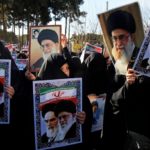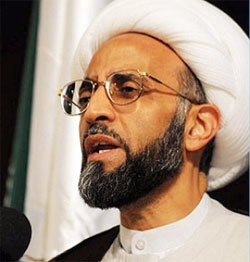
One of the consequences of the absence of the human dimension among the exponents of the religious discourse is that our societies are placed at the top of the global index of violators of freedom. The bitter fruit of this discourse has been the marginalisation of the dignity of Man, and the generation of extremist thought, hatred and exclusion.
THE MESSAGE of the Qur’ān was one of honouring mankind, of raising his station and his potential. In the words of the Almighty: Verily we have honoured the children of Adam. We carry them on the land and the sea, and have made provision of good things for them, and have preferred them above many of those whom We created with a marked preferment.[1]
Shaykh Hasan al-Saffār in his valuable work on values entitled Islamic Discourse and the Rights of Man states that:
When God Almighty created Man he made for him a cosmic festival to celebrate his birth and existence, and ordered the angels to conduct welcoming ceremonies and honour him by bowing down unto him, and said “since I have fashioned him and breathed into him of My spirit, then fall down prostrate before him.” So the angels prostrated themselves one and all.
Islamic society is required to safeguard human rights as an integral part of its culture
The Qur’ān makes an association between honour and humankind, that is, it honours man simply for his being human. Humanity, of itself, is the cause for this divine honour – not religion, nor doctrine, nor gender, nor colour nor language. Mankind, therefore, being created and honoured by his Creator, is being honoured by none other than Almighty God. With this attribute, the attribute of divine honour, he has his full rights, such as any other honoured creature without distinction or preference. Nothing – neither state, nor community nor individual – may impinge upon his dignity or violate his rights or deprive him of his freedoms. Therefore the subject of ‘human rights’ is part and parcel of the doctrine and belief of a Muslim. It means that Islamic society is required to safeguard human rights and place them as an integral part of its culture. It must demonstrate this in its behaviour and in its dealings and relations, through a culture of dialogue, tolerance and acceptance of the other, and by exalting the values of freedom, justice and equality.
So let us now ask ourselves this: to what extent is the prevailing religious discourse in harmony with the Qur’ānic message on the issue of man’s dignity and his rights? Is it capable at present of representing this divine honouring of man? Is it up to the task of translating what this divine honouring of man means in its educational discourse, its proselytism or its sermons, or in its committees issuing fatwas, or even in its Sahwist[2] political application? Has the current religious discourse been keeping pace with the Qur’ānic message that raises mankind’s worth and exalts his status, for his simply being human? I do not imagine it has. Neither in archaic religious discourse as contained in traditional works of fiqh, nor in the contemporary religious discourse of satellite channels, websites and mosque pulpits. Nor even in religious newspapers, magazines and tapes or in pamphlets distributed free. If earlier religious discourse had believed in the dignity of Man – really believed it – it would not have licensed the so-called unilaterally declared jihad, the ‘defensive jihad’, which implies fighting the infidel not for any enmity which Muslims might have suffered from them, but simply for their being infidels, forcing them to choose between Islam or death, except if they happen to be People of the Book, in which case they have a third choice – the jizya.[3]
If they had believed in the dignity of Man, that he possessed inalienable rights, they would not have oppressed the Christians and the Jews, and forced them onto the edge of the path when passing in the street, or made them wear identifying clothes, or prevented them from building their places of worship. Yet religious discourse in Kuwait, for example, still denies the Bohri Shi‘ites’[4] their right to build themselves a mosque, on the grounds that they are an ‘errant, deviant sect’.
It appears that the issues of freedom and rights lie outside the domain of religious discourse
Had religious discourse in practice adopted universal human dignity it would not have spoken in terms that calibrate that dignity, that it should be restricted to Muslims alone. Nor would it have shrunken the circle even more by limiting it to the followers of just one doctrinal group, that the right to dignity was not be applied to anyone else, to those who oppose them or who followed heretical views. Nor would it have held that the material and moral rights due to them should be expropriated, as Shaykh al-Saffār points out.
Were the religious discourse, as it is put into practice, really believing in the worth of Man it would not have supported the practice of distinction and inequality against woman in all her rights, nor hold that her bloodwit was worth half that of a man’s. Nor would it have imposed patronage upon her in all her dealings. Nor would it have called for the marginalisation of her role in society and education.
Were the dignity of Man a supreme value embedded in this religious discourse, the books of fiqh would not be stuffed full with voices speaking of the impurity of the infidel, that a believer may not be executed for killing an infidel, or that his bloodwit is half that of a Muslim. Nor would contemporary religious discourse be inciting still against the infidel and cursing them, and nor would fatwas be promulgated obliging the Muslim to harbour hostility to them should they find themselves resident in infidel lands.
The inhumane inclination in some fatwas mentioned by Shaykh al-Saffār in his book reaches the point where a contemporary shaykh was asked about the legitimacy of aiding non-Muslims at times of disaster – and even Muslims professing a different doctrine from his own. The shaykh’s answer was to refuse it outright in a language brimming with unconcealed hatred and contempt:
Our view is that one should not give aid to non-Muslims, for these are enemies of the faith, even if they were to die of hunger, or be killed by the cold or the heat or by drowning or the collapse of buildings, for such things should be seen as a punishment from God for their disbelief and heresy.
Such are the workings of the man’s inhumanity and blind fanaticism! That Shaykh was also asked that if most of those injured by these events were heretics, were Islamic charitable organisations permitted to help them? He said:
Muslims are not allowed to help heretics such as the Shi‘a and the ‘tomb-worshippers’ [by which he meant Sufis], nor believers in heresies such as the Alawites and the Druze, the Ahmadis, Sikhs and Barelwis and the like. Whatever befalls them – drowning, shipwreck, drought or sickness, is but a punishment from God and so they may not be granted aid.
The fanaticism of this shaykh, whom I would rather not mention by name, but is one who certainly represents a large sector of shaykhs who look up to him and his doctrine, reaches the point where he says:
Sunni Muslims must feel hatred, loathing and disdain for heretics such as the Shi‘a and the Mu‘attila[5] and the tomb-worshippers and the Ibadis. Similarly the Muslims must keep away from them – no matter how many they are in the country – so as to be free of their evil.
We have to ask ourselves, are these fatwas promulgated by a mentality that believes in the dignity of Man or one that is sick with blind fanaticism?
The absence of the human dimension has hindered democratic progress and interaction with the modern age
When the Tsunami disaster struck south Asia, the western communities called on and activated their charity organisations and hastened to provide aid and support, while our societies dragged their feet and were sluggish. The dullness of human sentiment among our shaykhs reached the point where they considered that what happened was a divine punishment for the perverseness of these communities. So we should not be surprised if the most that the religious discourse is interested in is to call for more observation of worship and ritual, and to issue exaggerated warnings against those who are recalcitrant, warning about the seductiveness of women and against the mingling of the genders. The abiding preoccupation of the religious discourse is to set up bulwarks against what it considers to be an intellectual assault from the West. It seeks solutions in the archaic heritage and hastens to accuse those who stand in its way as infidels and corruptors, whether they be secular or believers in alternative religious doctrines.
Exponents of the religious discourse have but a weak interest in the Rights of Man, and their response to violations suffered by Muslims in Muslim lands is non-existent. It appears that the issues of freedom and rights lie outside the domain of religious discourse. Indeed, this discourse actively supports the reduction of freedoms, particularly the freedoms of expression and of the media, freedom of thought and the freedom of womankind. If the practitioners of this religious discourse had their way, they would confiscate books and imprison thinkers, abuse their political opponents, shut down the satellite channels and close down the press. They would force women back into their homes. Recently Al-Azhar demanded the confiscation of Ahmad Rāsim al-Nafīs’ valuable book My Journey among the Shi‘ites and Shi‘ism.[6]

Suggested Reading
One of the consequences of the absence of the human dimension among the exponents of the religious discourse is that our societies are placed at the top of the global index of violators of freedom. At a time when democratic experiments have scored success and born fruit among other nations, our societies have tottered in their democratic transition initiatives. This can only be ascribed to the state of ‘prohibition’ which this discourse has rooted deeply within in our societal infrastructure. It has hindered democratic progress and disrupted its interaction with the modern age and its givens. The bitter fruit of this discourse has been the marginalisation of the dignity of Man, and the generation of extremist thought, hatred and exclusion – a trio which has spawned a culture of violence, as represented most conspicuously by al-Qaeda.
[1] [Qur’ān, XVII,70]
[2] Sahwist, from al-Sahwa al-Islamiyya (‘The Islamic Awakening’), the movement that in the 1970s gained momentum for a revival of Salafist Islam. See Glossary: Islamic Awakening.
[3] ‘Poll-tax’; see Glossary: jizya.
[4] There are 50,000 Bohras living in Kuwait. The Bohra Shi‘ite community of Kuwait had requested the late Shaykh Jābir al-Ahmad for permission to build a mosque in Kuwait at Ardhiya. The request was granted but the Technical Committee of the Municipal Council turned down their request, despite article 29 of the Kuwaiti Constitution which protects the religious freedom of all communities. (Ed.)
[5] The mu‘attila (‘negators’) deny God any attributes, negating (ta‘tIl) any anthropomorphization or attribution of human characteristics to God. See Glossary: Ta‘tīl.
[6] A. R. Al-Nafīs, رحلتي مع الشيعة والتشيع في مصر (رؤية شيعية) (‘My Journey among the Shi‘ites and Shi‘ism in Egypt – a Shī‘ite View’). The work is by a Shi‘ite activist in Egypt who converted from Sunnism. It is a personal account of his conversion and an account of Shi‘ism as a faith and a culture. (Ed.)


